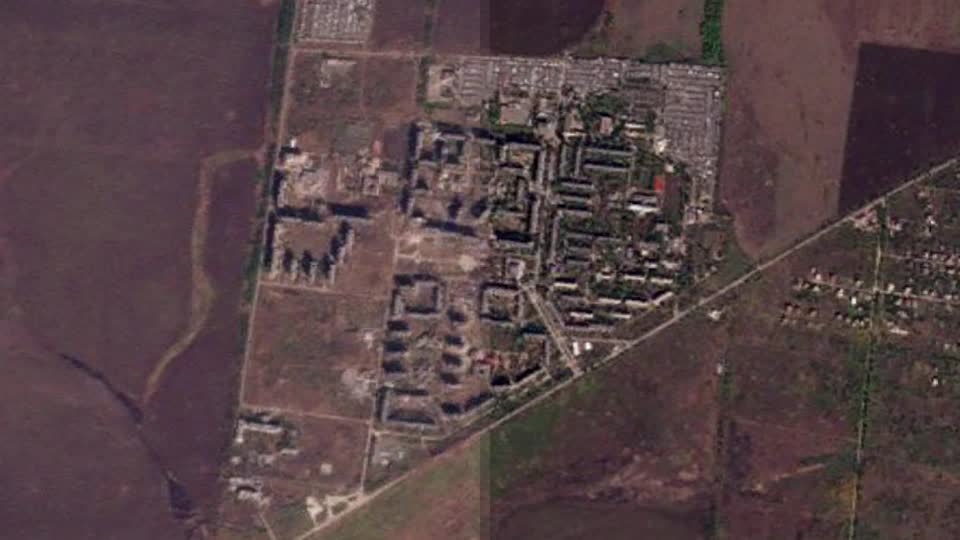Russian troops reach centre of Ukrainian bastion Vuhledar

By Olena Harmash and Gleb Garanich
KYIV (Reuters) -Russian troops have reached the centre of Vuhledar, a bastion on strategic high ground in eastern Ukraine that had resisted Russian assaults since Moscow’s full-scale invasion, the regional governor of Ukraine’s Donetsk region said on Tuesday.
Footage posted to social media showed Russian soldiers waving a flag from atop a bombed-out multi-storey building and unfurling another flag on a metal spire on a roof. Reuters determined the footage matched street patterns of Vuhledar.
Other images showed smoke rising over the ruins of the small mining town, a major battlefield where Ukrainian units had held off previous armoured Russian assaults throughout two and a half years of war.
“The enemy is already nearly in the centre of the city,” regional governor Vadym Filashkin told Ukrainian TV, describing the situation as very difficult.
Vuhledar has strategic significance because of its high ground and its location near the junction of the two main fronts, in eastern and southern Ukraine. Russian forces reached the outskirts last week and intensified their offensive push in recent days.
Andriy Nazarenko, commander of a drone battalion of the 72nd Mechanized Brigade defending the town, said they were outgunned and outmanned in Vuhledar.
“The situation in Vuhledar is very difficult, it is the hardest because assaults have been going on for more than six months and the enemy is constantly rotating its ranks with fresh, trained forces,” Nazarenko told Reuters.
Speaking from an undisclosed location during a Zoom interview, Nazarenko said his unit was doing everything possible to maintain “a window” for the infantry to be able to retreat from the town.
RUSSIA’S FAST ADVANCE
Since August, Moscow’s troops in eastern Ukraine have advanced at their fastest rate for more than two years, with little letup despite Ukrainian forces mounting a surprise incursion into Russia’s Kursk region.
Previous Russian assaults on Vuhledar had been particularly bloody, with tanks and armoured vehicles assaulting over open ground. Ukrainian military units released pictures on Tuesday of Russian tanks on fire in fields.
Oleksandr Kovalenko, a Ukrainian military analyst, said that about 2,000-3,000 Russian troops were in the town, attacking from three different directions.
“We will not be able to hold on in Vuhledar in these conditions,” Kovalenko told Reuters, saying the decision to retreat from Vuhledar should be taken quickly.
Full control over Vuhledar would help Moscow’s troops to improve their logistics by using railways more actively, easing their further advance in the region and giving them positions on heights to fire artillery.
The Russian forces already relentlessly shell towns and villages across the region, said Filashkin, the governor, urging people to leave.
Filashkin said that about 350,000 people still remained in the government-held parts of the region. Before the start of the full-scale invasion in 2022, government-held areas held about 1.9 million people. Only 107 civilians remained in Vuhledar, which had a pre-war population of about 14,000, he said.
The Donetsk region, where Russian proxy forces launched a revolt in 2014, is one of four Ukrainian provinces that Moscow claims to have annexed since launching its full-scale invasion in 2022. Moscow says capturing the rest of the province is one of its principal war aims.
Ukraine drove back Russian forces from the outskirts of Kyiv and recaptured territory in major counter-offensives in 2022. But another big Ukrainian counter-offensive last year was a failure and since then Russian forces have mostly had the battlefield initiative.
President Volodymyr Zelenskiy has called for more Western support to allow Ukraine to push back the Russians, including permission to use long-range weapons to strike deep into Russia.
(Reporting by Olena Harmash, Editing by Peter Graff and Alexandra Hudson)